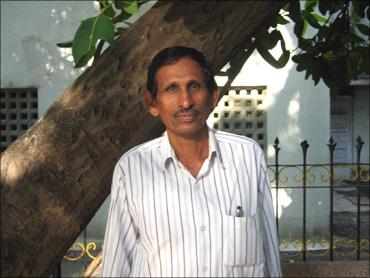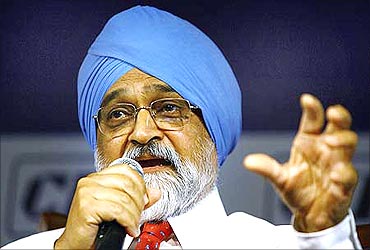 | « Back to article | Print this article |
So how far can Rs 32 a day take you?
Planning Commission Deputy Chairman Montek Singh Alhluwalia has said that a person who can spend Rs 32 a day in urban India -- and Rs 26 a day in rural India -- is not poor and that he is above the poverty line.
He has since changed his mind; or has been forced to change it and is likely to make a statement on the issue soon.
Most people doubt that one can live on Rs 32 a day in urban India. Is it possible? How much money do you need to live or survive in a city like Mumbai?
Pandurang Wadekar tried to live on Rs 32 a day and landed up spending Rs 39.
His actual day to day expenses on a normal day in his life is close to Rs 50.
So how did his expenses pan out when he tried to make do with only Rs 32? Click NEXT to read on . . .
So how far can Rs 32 a day take you?
When he tried to live on Rs 32, his expenses were as follows:
- Vegetables: Rs 12
- Atta: Rs 3
- Sugar: Rs 3
- Masala: Rs 3
- Dal: Rs 3
- Tea: Rs 3
- Soap: Rs 3
- Blade (shave) : Rs 2
- Milk: Rs 7
Total: Rs 39
Pandurag Wadekar is 51 years old. He has studied up to 10th standard. He is married to Shanta, who has studied up to 4th standard. They have a son, Satish, who they have educated very well. He has a master's degree in computer science and is a teacher.
Click NEXT to read on . . .
So how far can Rs 32 a day take you?
Pandurang came to Mumbai from the Chilwanti village in the Latur district of Maharashtra. He is now a supervisor at a housing society at Lokhandwalla, Andheri, a Mumbai suburb.
For the last six years he has been ironing clothes to augment his income.
As he has a ration card in his village, he cannot apply for one here. So he has to buy all his goods in the open market.
Being a society supervisor has its advantages. He has a free one-room dwelling, free electricity and also a mobile phone that the society has given him.
He says he spends Rs 4,000 on his family for food every month. Once in six months, he spends Rs 500 on new clothes for himself, Rs 700 on new clothes for his wife and Rs 1,000 on new clothes for his son.
Click NEXT to read on . . .
So how far can Rs 32 a day take you?
He pays an insurance premium of Rs 1,000 a year and also saves about Rs 500 every month which he deposits in his bank account.
He never eats out and that goes for his family too. "Expenses will skyrocket if we do that," he said with a smile. We did not ask him whether he occasionally visits the theatres to watch a movie.
This works to about Rs 50 per day for him. This is only possible because he need not commute to work. He does not have to pay for rent, electricity or his phone.
Others have to pay for these too every day, Montek Singh-ji, not to mention the expense on healthcare and education.



